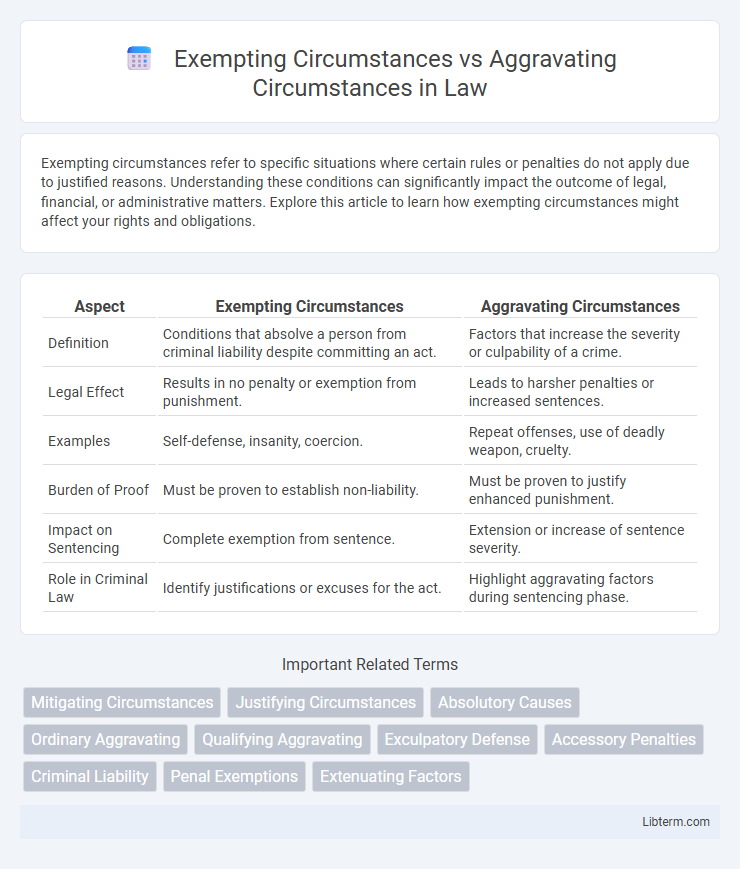Exempting circumstances refer to specific situations where certain rules or penalties do not apply due to justified reasons. Understanding these conditions can significantly impact the outcome of legal, financial, or administrative matters. Explore this article to learn how exempting circumstances might affect your rights and obligations.
Table of Comparison
| Aspect | Exempting Circumstances | Aggravating Circumstances |
|---|---|---|
| Definition | Conditions that absolve a person from criminal liability despite committing an act. | Factors that increase the severity or culpability of a crime. |
| Legal Effect | Results in no penalty or exemption from punishment. | Leads to harsher penalties or increased sentences. |
| Examples | Self-defense, insanity, coercion. | Repeat offenses, use of deadly weapon, cruelty. |
| Burden of Proof | Must be proven to establish non-liability. | Must be proven to justify enhanced punishment. |
| Impact on Sentencing | Complete exemption from sentence. | Extension or increase of sentence severity. |
| Role in Criminal Law | Identify justifications or excuses for the act. | Highlight aggravating factors during sentencing phase. |
Understanding Exempting Circumstances
Exempting circumstances refer to situations where an individual's liability for a criminal act is nullified due to factors such as self-defense, involuntary intoxication, or lack of intent, effectively removing criminal responsibility. Understanding exempting circumstances is crucial for accurately determining whether a defendant should be absolved from punishment despite the commission of an act typically considered illegal. These circumstances differ from aggravating circumstances, which increase the severity or culpability of an offense based on factors like premeditation or cruelty.
Defining Aggravating Circumstances
Aggravating circumstances refer to factors or conditions that increase the severity or culpability of a criminal offense, often leading to harsher penalties or sentences. Common aggravating circumstances include prior criminal history, the use of a weapon, or committing the crime with extreme cruelty or premeditation. These factors contrast with exempting circumstances, which can justify or mitigate the offender's responsibility and reduce the crime's severity.
Legal Basis: Exempting vs Aggravating Circumstances
Exempting circumstances, as defined under the Revised Penal Code of the Philippines, nullify criminal liability despite the commission of the act, such as insanity or minority, as stated in Article 12. Aggravating circumstances, specified in Article 14, increase the offender's liability by intensifying the seriousness of the crime, including factors like treachery, abuse of superior strength, or evident premeditation. The legal basis for distinguishing these lies in their impact on criminal responsibility, where exempting circumstances negate liability while aggravating circumstances elevate penalties.
Key Differences Between Exempting and Aggravating
Exempting circumstances eliminate criminal liability by proving the act was committed without criminal intent or due to justifiable reasons such as self-defense or insanity, whereas aggravating circumstances increase the severity of the offense and lead to harsher penalties by highlighting factors like premeditation, recidivism, or cruelty. Exempting circumstances serve as legal defenses that can result in acquittal, while aggravating circumstances influence the degree of punishment imposed by the court. The key difference lies in exempting circumstances nullifying guilt, whereas aggravating circumstances intensify criminal responsibility.
Common Examples of Exempting Circumstances
Common exempting circumstances include self-defense, involuntary intoxication, and necessity, each allowing the accused to avoid criminal liability by proving the act was justified or unavoidable. Insanity or mental incapacity is a significant exempting circumstance, where the defendant lacks the mental capacity to understand wrongfulness at the time of the offense. These circumstances distinguish from aggravating factors, which increase the severity of the penalty rather than absolve responsibility.
Common Examples of Aggravating Circumstances
Common examples of aggravating circumstances include committing a crime with premeditation, using a weapon, causing severe injury or death, and targeting vulnerable victims such as children or the elderly. These factors intensify the severity of the offense and often result in harsher penalties under criminal law. Unlike exempting circumstances, which may mitigate or excuse the crime, aggravating circumstances justify increased punishment due to the offender's conduct or the impact on the victim.
Impact on Criminal Liability
Exempting circumstances, such as self-defense or necessity, eliminate criminal liability by justifying or excusing the defendant's actions, leading to acquittal or dismissal of charges. Aggravating circumstances, including cruelty or premeditation, increase the severity of the offense and result in harsher penalties or longer sentences. The presence of exempting circumstances negates the criminal act's wrongful nature, whereas aggravating factors intensify legal accountability and influence judicial sentencing decisions.
Application in Judicial Proceedings
Exempting circumstances in judicial proceedings refer to conditions or factors that absolve a defendant from criminal liability, such as self-defense or mental incapacity, leading to acquittal or reduced charges. Aggravating circumstances, including prior criminal record or use of excessive violence, intensify the severity of the offense and result in harsher sentencing or penalties. Courts apply these factors by carefully evaluating evidence and legal standards to ensure fair and proportionate judgments based on the presence or absence of these circumstances.
Jurisprudential Interpretations
Exempting circumstances in jurisprudence reduce or eliminate criminal liability when factors like self-defense or insanity negate culpability, as established in landmark cases such as People v. Geronimo. Aggravating circumstances, conversely, intensify penalties due to factors like premeditation or cruelty, supported by rulings including People v. Datumulok. Jurisprudential interpretations emphasize the importance of carefully distinguishing these circumstances to ensure just and proportionate sentencing under criminal law.
Conclusion: Balancing Justice and Equity
Balancing justice and equity requires careful evaluation of exempting circumstances, such as mental incapacity or duress, which may reduce or eliminate culpability, against aggravating circumstances like premeditation or cruelty that intensify the severity of the offense. Courts weigh these factors to ensure proportional sentencing that reflects both the offender's intent and the impact on victims. Achieving this balance promotes fairness by tailoring legal consequences to the nuanced realities of each case, thereby upholding the principles of just punishment and social equity.
Exempting Circumstances Infographic

 libterm.com
libterm.com